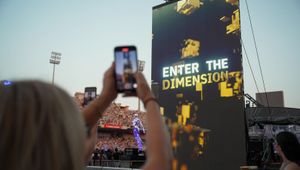
Truly, Madly, Deeply – Nailing an Authentic Brand Experience

There’s always an unspoken fear in the back of your mind when you’re creating a live experience, especially one that’s never been done before. It’s that fear that wakes up the producer at 3am to write emails and production checklists. It’s usually something along the lines of ‘I hope the tech works’ or ‘I hope no-one has a terrible time and moans on Instagram’. In Padua, at Desperados’ Deep House experience, the fears were a lot…deeper.
But that’s what happens when you create a unique party experience in a challenging environment for 90 strangers from around the world, keeping them safe with hardware none of them have used before, while dazzling them with lasers, sound and dancers…and making sure they get to have fun in the midst of it all.
But before we get to the what: the why.
Let’s face it – influencer marketing is in a bit of a parlous state. We’ve all seen products and brands clumsily featured on Influencers’ channels. Or even accidentally copying and pasting their ‘please write something like this’ instructions before ‘their’ copy.
It really slips into the dark arts when influencers, keen to avoid the dreaded #ad that shows they’ve been paid by The (Wo)Man, are instead agreeing to do paid take-down posts and videos of rival brands for $$$$.
And all this in the quest for authenticity. Marketing’s new holy grail. Despite the fact that it’s entirely nebulous and subjective, it’s almost replaced ‘storytelling’ as our industry’s most chronically over-used term.
(I say nebulous and subjective…apparently this hasn’t stopped Shutterstock from offering it as a toggleable search. Can’t wait for Final Cut Pro’s ‘export as viral video’ option.)

But the funny thing is…we talk a big game about authenticity but often fail to deliver. Our recent Experience Brand Index report found that 39% of M*ll*nn**ls believe that brands pretend to be something they’re not.
Any brand worth its salt knows that inauthenticity will get sniffed out quickly. Desperados avoid this by building their entire global comms strategy on ‘Acts (not Ads)’: they don’t make ads, they create real crazy party experiments – undisputable proof of their brand promise and a nod to their product origin - which they film and turn into their global media assets.
It’s really the only sane solution. Desperados operate in one of the trickiest areas for authenticity – party moments at the cool end of electronic music. It’s an unforgiving space, with many ways for tone-deaf brands to misread the signs and come crashing in like an uncool uncle in the middle of a Snapchat rave.
And back to that influencer approach: if we’re elevating the conversation above #paid endorsements, we have to create moments – acts – that are so spectacular, innovative and just plain fun that people can’t help but tell their friends and followers all about it, whether they’re there in person or watching on their phone.
So that’s what led us (Desperados and an inter-agency team) to create Deep House – the world’s deepest dance floor. A truly immersive party experience in the deepest pool in the world (the Y-40, in case you were wondering).
It was quite a thing. Underwater lazers and lights, semi-amphibious swimming dancers, SeaTrek helmets and an Elrow party around the pool, in all its confetti-strewn mayhem.
As we swept up that confetti and wrung out the last gold-sequined top, the feedback and PR pick-up confirm the authenticity of the party experience. And not just a push-the-sofas-back-and-turn-up-the-tunes moment. An epic party, that demonstrates the value brands can bring when they live up to their brand promises and approach a much-loved passion point with the right attitude and a unique ability to turn a party into a world-first.
Caspar Mason is Creative Strategy Director at Jack Morton















